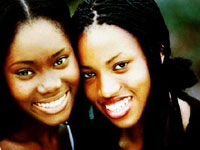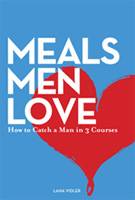Martina Owens Alopecia Areata Awareness Week Interview
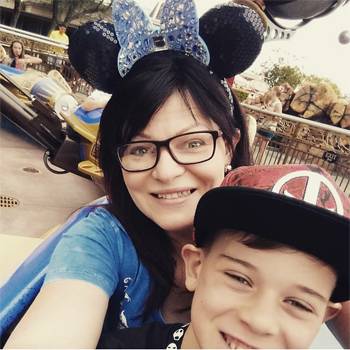
Martina Owens Alopecia Areata Awareness Week Interview
Alopecia Areata Awareness Week 13 – 20 November 2016
Almost half a million Australians are affected by Alopecia Areata, a disease that results in hair loss in the scalp and elsewhere on the body.
The hair loss can range from several bald patches, to total baldness. It affects women, men and children. The onset is often sudden, random and frequently reoccurring. Currently, there is no cure.
While Alopecia is not-life threatening, it is definitely life changing.
Chel Campbell, President of Australia Alopecia Areata Foundation (AAAF), says that Alopecia can have a profound psychological and emotional impact on individuals.
'Throughout history, there has been a huge stigma associated with hair loss and baldness. It's not uncommon for people with Alopecia Areata to experience depression, anxiety and social phobias."
Martina Owens' journey with Alopecia Areata began when she was pregnant with her first child. She was 27 years old.
'Each morning, I would wake up to see my pillowcase covered in hair. I found myself not wanting to see my reflection. Eventually, I became totally bald. My eyebrows were gone, my eyelashes too, I didn't grow hair under my arms anymore, even the hairs inside my nose disappeared, along with my confidence and my happy-go-lucky attitude," says Martina.
'I had to keep telling myself that it was -only hair' and that -I wasn't dying', but I felt like my world was crashing down around me."
'My confidence made a return, to a degree, with the purchase of a wig. I carried on with life as best I could. I married the love of my life wearing a wig and skillfully drawn on eyebrows, Alopecia Areata wasn't going to wreck my wedding day! My hair made another appearance when I fell pregnant with my second child – only to have it fall out again after the birth."
'The hardest part of Alopecia Areata is accepting the way I look today, not a year ago with hair, or living for the future – wishing that my hair returns. Today, I am totally bald. Apart from that, I am well. There is nothing stopping me from getting on with life. However, even though I know my family and friends love for who I am, sometimes it's really hard to feel like a whole woman, feel attractive or even sexy for my husband."
'I never thought that I was vain, but losing my hair showed me how much hair and appearance really matters to the world around me. I think society needs to place less value and judgment on people's outward appearance; I am worth more than a head of hair."
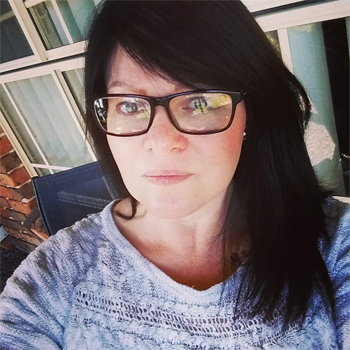 Organised by Australia Alopecia Areata Foundation (AAAF), Alopecia Areata Awareness Week, which takes places between 13 and 20 November, seeks to build more awareness and understanding about the condition.
Organised by Australia Alopecia Areata Foundation (AAAF), Alopecia Areata Awareness Week, which takes places between 13 and 20 November, seeks to build more awareness and understanding about the condition.
'Alopecia affects around 2% of the population, yet very few people have even heard of it, let alone understand it. This has a huge effect on those living with the disease." Says Mrs Campbell, President of AAAF.
'Our hope is that Alopecia Areata Awareness Week will challenge the stigma associated with hair loss, build understanding about the condition within society, and importantly, let those living with the condition know – that they are not alone."
AAAF will hold numerous events across Australia during Alopecia Areata Awareness Week (13-20 November). For more information visit http://www.aaaf.org.au/events/
The Australia Alopecia Areata Foundation (AAAF) is a not-for-profit that provides people with Alopecia and their families with essential support. AAAF also funds research into the disease in order to find a cure or acceptable treatment, and informs and educates the public about the condition.
Anyone affected by Alopecia can find support through AAAF. For information on support groups and other services visit: www.aaaf.org.au
Almost half a million Australians are affected by Alopecia Areata, a disease that results in hair loss in the scalp and elsewhere on the body.
The hair loss can range from several bald patches, to total baldness. It affects women, men and children. The onset is often sudden, random and frequently reoccurring. Currently, there is no cure.
While Alopecia is not-life threatening, it is definitely life changing.
Chel Campbell, President of Australia Alopecia Areata Foundation (AAAF), says that Alopecia can have a profound psychological and emotional impact on individuals.
'Throughout history, there has been a huge stigma associated with hair loss and baldness. It's not uncommon for people with Alopecia Areata to experience depression, anxiety and social phobias."
Martina Owens' journey with Alopecia Areata began when she was pregnant with her first child. She was 27 years old.
'Each morning, I would wake up to see my pillowcase covered in hair. I found myself not wanting to see my reflection. Eventually, I became totally bald. My eyebrows were gone, my eyelashes too, I didn't grow hair under my arms anymore, even the hairs inside my nose disappeared, along with my confidence and my happy-go-lucky attitude," says Martina.
'I had to keep telling myself that it was -only hair' and that -I wasn't dying', but I felt like my world was crashing down around me."
'My confidence made a return, to a degree, with the purchase of a wig. I carried on with life as best I could. I married the love of my life wearing a wig and skillfully drawn on eyebrows, Alopecia Areata wasn't going to wreck my wedding day! My hair made another appearance when I fell pregnant with my second child – only to have it fall out again after the birth."
'The hardest part of Alopecia Areata is accepting the way I look today, not a year ago with hair, or living for the future – wishing that my hair returns. Today, I am totally bald. Apart from that, I am well. There is nothing stopping me from getting on with life. However, even though I know my family and friends love for who I am, sometimes it's really hard to feel like a whole woman, feel attractive or even sexy for my husband."
'I never thought that I was vain, but losing my hair showed me how much hair and appearance really matters to the world around me. I think society needs to place less value and judgment on people's outward appearance; I am worth more than a head of hair."
 Organised by Australia Alopecia Areata Foundation (AAAF), Alopecia Areata Awareness Week, which takes places between 13 and 20 November, seeks to build more awareness and understanding about the condition.
Organised by Australia Alopecia Areata Foundation (AAAF), Alopecia Areata Awareness Week, which takes places between 13 and 20 November, seeks to build more awareness and understanding about the condition. 'Alopecia affects around 2% of the population, yet very few people have even heard of it, let alone understand it. This has a huge effect on those living with the disease." Says Mrs Campbell, President of AAAF.
'Our hope is that Alopecia Areata Awareness Week will challenge the stigma associated with hair loss, build understanding about the condition within society, and importantly, let those living with the condition know – that they are not alone."
AAAF will hold numerous events across Australia during Alopecia Areata Awareness Week (13-20 November). For more information visit http://www.aaaf.org.au/events/
The Australia Alopecia Areata Foundation (AAAF) is a not-for-profit that provides people with Alopecia and their families with essential support. AAAF also funds research into the disease in order to find a cure or acceptable treatment, and informs and educates the public about the condition.
Anyone affected by Alopecia can find support through AAAF. For information on support groups and other services visit: www.aaaf.org.au
Interview with Martina Owens and Chel Campbell, President of Australia Alopecia Areata Foundation
Question: What is Alopecia Areata?
Chel Campbell: Almost half a million Australians are affected by Alopecia Areata, a disease that results in hair loss on the scalp and elsewhere on the body. The hair loss can range from several bald patches, to total baldness. It affects women, men and children. The onset is often sudden, random and frequently reoccurring. Currently, there is no cure.
Question: When did you first notice the symptoms associated with Alopecia Areata?
Martina Owens: My journey with Alopecia Areata started around the same time as I discovered I was pregnant with my first child. I was 27 years old.
The first signs of hair loss came as I left the hairdressers with a glowing mane of newly coloured hair. I was checking myself out in the mirror, when I saw by each temple, a smooth hairless area about the size of two fifty cent pieces. I immediately put it down to my hair being over coloured and stressed out.
I didn't think again of it until about one month post pregnancy, when my hair began to fall out in giant clumps. Eventually, I became totally bald. My eyebrows were gone, my eyelashes too, I didn't grow hair under my arms anymore, (let alone in any other private areas) and even the hairs inside my nose disappeared, along with my confidence and my happy-go-lucky attitude.
Doctors tested me for countless -illnesses' but no clear cut answers were given, which was so frustrating and really taxing on myself esteem. I thought if I had a condition to blame, then I could take some comfort in knowing it was nothing I had done to cause it. So with endless tests done and countless hours on the internet, it was put down to unexplained sudden and total hair loss – Alopecia Areata
Question: How did you originally cope with the loss of all your hair?
Martina Owens: Each morning I would wake up to see my pillowcase covered in hair. It was distressing to say the least. I found myself not wanting to see my reflection, and even worse not wanting my husband to see my hair loss.
Everything seemed to be telling me that I was faulty. Every time I put on the TV or flicked through a magazine, I was bombarded with adverts for hair shampoos and treatments, for which I had no use anymore. Even hearing and seeing my girlfriend's results from a trip to the hairdressers upset me. I had to keep telling myself that it was -only hair' and that -I wasn't dying', but I felt like my world was crashing down around me.
My confidence made a return, to a degree, with the purchase of a wig, and I carried on with life, as best I could. I married the love of my life wearing a wig and skillfully drawn on eyebrows, Alopecia Areata wasn't going to wreck my wedding day!
My hair made another appearance when I fell pregnant with my second child – only to have it fall out again after the birth.
The day, my then, three year old son told me that he wished he could give me his hair so I wouldn't be upset anymore, made me reassess what was important in life – my family and friends who loved me for being me.
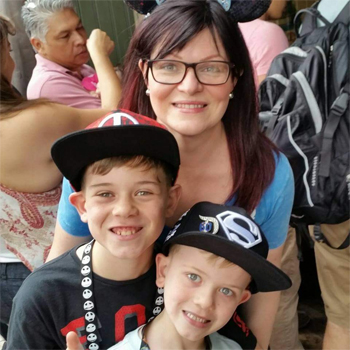 Question: Do you wear a wig?
Question: Do you wear a wig?
Martina Owens: Yes.
Question: How does Alopecia Areata affect you on a daily basis?
Martina Owens: The daily challenges of dealing with Alopecia Areata vary from, an ultra-sensitive nose due to no nasal hairs, and how important eyelashes are (they actually are very clever little hairs that do more than you think), the art of drawing on eyebrows daily, or accidently wiping your eyebrow off (the horror!) or worrying about windy days (hair flying off into the distance) and summertime being a little uncomfortable wearing wigs.
Question: What has been your biggest challenge after your diagnoses?
Martina Owens: The hardest part of Alopecia, however, is accepting myself the way I am today. Not a year ago with hair, or living for the future, wishing that my hair returns. Today, I am totally bald. Apart from that, I am well. There is nothing stopping me from getting on with life. Even though sometimes it's really hard to feel like a whole woman, feel attractive or even sexy for my husband, I now know that my hair doesn't define me and that I am loved, hair or no hair.
Question: What advice do you have for others who have recently been diagnosed with Alopecia Areata?
Martina Owens: It does feel like the end of the world. Its ok. Get angry, be sad if you want to be sad. Divide how you want to deal with your loss and move on. You are more than just your hair. If you chose to wear wigs - rock it! If you chose to go bald- own it too! Its ok to have a down day, everyone has them. Its how you pick yourself up and continue on that makes you who you are.
Chel Campbell: Understand that there is help and that you are not alone, please contact Australia Alopecia Areata Foundation. Losing ones hair is emotionally sole destroying and you do go through a grieving process. Understanding this is normal is very helpful. (The words in black are Chel Campbell's, President of Australia Alopecia Areta Foundation.
Question: What's your message for Alopecia Areata Awareness Week?
Martina Owens: Alopecia Awareness Week is important to help inform the wider community about the condition, so there is less judgement placed on people's outward experience. I never thought that I was vain, but losing my hair showed me how much hair and appearance really matters to the world around me. I think society needs to place less value and judgment on people's outward appearance; I am worth more than a head of hair.
Question: How can Australians support Alopecia Areata?
Chel Campbell: Australians can do lots to support people with Alopecia Areata:
You can donate essential funds to Australia Alopecia Areata Foundation (AAAF), a not-for-profit that provides vital support to those with Alopecia Areata and helps fund research into a cure, find out more at https://aaaf.org.au/get-involved/donate-funds/
You can donate your hair. Donating hair is extremely rewarding and is a very precious gift for someone who does not have hair, find out more at https://aaaf.org.au/get-involved/donate-hair/
Sign the petition to 'Remove GST on Medical Wigs'. For the last five years, AAAF has been lobbying the Australian Federal Government to amend the unfair rulings which do not allow Alopecia Areata suffers to be exempt from paying GST on their wigs. Find out more at https://www.change.org/p/the-hon-sussan-ley-remove-gst-from-medical-wigs
Learn more about Alopecia Areata to help remove the stigma associated with hair loss. AGAIN please note the answer to this question is from Chel Campbell, President of AAAF.
Interview by Brooke Hunter
Chel Campbell: Almost half a million Australians are affected by Alopecia Areata, a disease that results in hair loss on the scalp and elsewhere on the body. The hair loss can range from several bald patches, to total baldness. It affects women, men and children. The onset is often sudden, random and frequently reoccurring. Currently, there is no cure.
Question: When did you first notice the symptoms associated with Alopecia Areata?
Martina Owens: My journey with Alopecia Areata started around the same time as I discovered I was pregnant with my first child. I was 27 years old.
The first signs of hair loss came as I left the hairdressers with a glowing mane of newly coloured hair. I was checking myself out in the mirror, when I saw by each temple, a smooth hairless area about the size of two fifty cent pieces. I immediately put it down to my hair being over coloured and stressed out.
I didn't think again of it until about one month post pregnancy, when my hair began to fall out in giant clumps. Eventually, I became totally bald. My eyebrows were gone, my eyelashes too, I didn't grow hair under my arms anymore, (let alone in any other private areas) and even the hairs inside my nose disappeared, along with my confidence and my happy-go-lucky attitude.
Doctors tested me for countless -illnesses' but no clear cut answers were given, which was so frustrating and really taxing on myself esteem. I thought if I had a condition to blame, then I could take some comfort in knowing it was nothing I had done to cause it. So with endless tests done and countless hours on the internet, it was put down to unexplained sudden and total hair loss – Alopecia Areata
Question: How did you originally cope with the loss of all your hair?
Martina Owens: Each morning I would wake up to see my pillowcase covered in hair. It was distressing to say the least. I found myself not wanting to see my reflection, and even worse not wanting my husband to see my hair loss.
Everything seemed to be telling me that I was faulty. Every time I put on the TV or flicked through a magazine, I was bombarded with adverts for hair shampoos and treatments, for which I had no use anymore. Even hearing and seeing my girlfriend's results from a trip to the hairdressers upset me. I had to keep telling myself that it was -only hair' and that -I wasn't dying', but I felt like my world was crashing down around me.
My confidence made a return, to a degree, with the purchase of a wig, and I carried on with life, as best I could. I married the love of my life wearing a wig and skillfully drawn on eyebrows, Alopecia Areata wasn't going to wreck my wedding day!
My hair made another appearance when I fell pregnant with my second child – only to have it fall out again after the birth.
The day, my then, three year old son told me that he wished he could give me his hair so I wouldn't be upset anymore, made me reassess what was important in life – my family and friends who loved me for being me.
 Question: Do you wear a wig?
Question: Do you wear a wig? Martina Owens: Yes.
Question: How does Alopecia Areata affect you on a daily basis?
Martina Owens: The daily challenges of dealing with Alopecia Areata vary from, an ultra-sensitive nose due to no nasal hairs, and how important eyelashes are (they actually are very clever little hairs that do more than you think), the art of drawing on eyebrows daily, or accidently wiping your eyebrow off (the horror!) or worrying about windy days (hair flying off into the distance) and summertime being a little uncomfortable wearing wigs.
Question: What has been your biggest challenge after your diagnoses?
Martina Owens: The hardest part of Alopecia, however, is accepting myself the way I am today. Not a year ago with hair, or living for the future, wishing that my hair returns. Today, I am totally bald. Apart from that, I am well. There is nothing stopping me from getting on with life. Even though sometimes it's really hard to feel like a whole woman, feel attractive or even sexy for my husband, I now know that my hair doesn't define me and that I am loved, hair or no hair.
Question: What advice do you have for others who have recently been diagnosed with Alopecia Areata?
Martina Owens: It does feel like the end of the world. Its ok. Get angry, be sad if you want to be sad. Divide how you want to deal with your loss and move on. You are more than just your hair. If you chose to wear wigs - rock it! If you chose to go bald- own it too! Its ok to have a down day, everyone has them. Its how you pick yourself up and continue on that makes you who you are.
Chel Campbell: Understand that there is help and that you are not alone, please contact Australia Alopecia Areata Foundation. Losing ones hair is emotionally sole destroying and you do go through a grieving process. Understanding this is normal is very helpful. (The words in black are Chel Campbell's, President of Australia Alopecia Areta Foundation.
Question: What's your message for Alopecia Areata Awareness Week?
Martina Owens: Alopecia Awareness Week is important to help inform the wider community about the condition, so there is less judgement placed on people's outward experience. I never thought that I was vain, but losing my hair showed me how much hair and appearance really matters to the world around me. I think society needs to place less value and judgment on people's outward appearance; I am worth more than a head of hair.
Question: How can Australians support Alopecia Areata?
Chel Campbell: Australians can do lots to support people with Alopecia Areata:
You can donate essential funds to Australia Alopecia Areata Foundation (AAAF), a not-for-profit that provides vital support to those with Alopecia Areata and helps fund research into a cure, find out more at https://aaaf.org.au/get-involved/donate-funds/
You can donate your hair. Donating hair is extremely rewarding and is a very precious gift for someone who does not have hair, find out more at https://aaaf.org.au/get-involved/donate-hair/
Sign the petition to 'Remove GST on Medical Wigs'. For the last five years, AAAF has been lobbying the Australian Federal Government to amend the unfair rulings which do not allow Alopecia Areata suffers to be exempt from paying GST on their wigs. Find out more at https://www.change.org/p/the-hon-sussan-ley-remove-gst-from-medical-wigs
Learn more about Alopecia Areata to help remove the stigma associated with hair loss. AGAIN please note the answer to this question is from Chel Campbell, President of AAAF.
Interview by Brooke Hunter
Have You Seen This?
MORE



